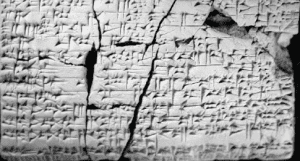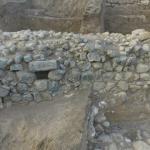An article in Haaretz: “Two 3,800-year-old Cuneiform Tablets Found in Iraq Give First Glimpse of Hebrew Precursor” (Ofer Aderet, 1-20-23), describes a very recent and exceptionally exciting discovery (I corrected a few typos):
“This is something sensational. I’m excited,” says Professor Nathan Wasserman of the Hebrew University Institute of Archaeology and Department of Ancient Near Eastern Civilizations. His colleague from the Tel Aviv University Archeology Department, Professor Yoram (Yori) Cohen, calls it a “paradigm change” of “very fundamental significance,” and doesn’t hesitate to use the word “amazing.”
The big news from the ancient world centers on two cuneiform tablets that have been dated to 1800 B.C.E., 3,800 years ago. This was the era of Hammurabi, the Babylonian king known for the Code of Hammurabi . . .
The text on the tablets resembles a language manual that is divided into two parts. On the first are words and phrases in the Amorite/Canaanite language – an extinct ancient language of which scholars hitherto had very little knowledge, and the second contains their translation into Akkadian, a known language that can be read and translated.
“In this text, which is very, very ancient, words appear that anyone who knows Hebrew will immediately recognize. You don’t have to be a linguist to understand the connection to Hebrew,” Cohen says. “Basically, we’re looking at our forefathers here,” he adds. “This is a very significant discovery for anyone who speaks Hebrew,” Wasserman comments.
Cohen adds that the text proves “beyond a shadow of a doubt” that already in the second millennium B.C.E there was a spoken language that was very close to Hebrew, which has been heretofore only known from the first millennium B.C.E. . . .
This language manual, which also includes sentences related to meetings between people, to addressing a king, to food preparation and to situations from everyday life, is practically the only documentation of the Amorite/Canaanite language and the fullest example of it to date. “Up to now, we’ve had a very fragmented acquaintance with Amorite/Canaanite, mainly from proper nouns and from a number of nouns from Babylonia and Canaan. And now suddenly the language is revealed to us with full documentation, with grammar, vocabulary, phrases and even poetry,” Cohen says.
Wasserman can hardly conceal his excitement over this text and from other parts of it that contain names of gods as well as expressions of love. “It’s pretty incredible. They were actually speaking a kind of Hebrew. It’s not really Hebrew, but it’s close to Hebrew,” he says. Cohen describes their language as “the mother of Hebrew” and says that “most scholars agree that Hebrew developed from it and is related to it.”
So now we’ve discovered “a spoken language that was very close to Hebrew” in 1800 BC in ancient Israel (Canaan). That would be quite a shock to many “higher criticism” Bible skeptics — were we able to raise them from the dead to inform them of this — (and a few stubborn holdovers today) who delighted in taunting Christians and Jews with their contentions that Moses (c. 1340 or 1330–c. 1220 or 1210 BC, in my reckoning, based on the eminent Egyptologist Kenneth Kitchen’s exhaustive research) wouldn’t have been able to read or write at all, let alone write the first five books of the Bible.
But now we have this evidence that predates his writing of the Torah (yes, I think he wrote it, and provide 50 reasons for why I think so) by some 500 years or more. It’s so old that it is contemporaneous with the life of Abraham (born c. 1880–1860 BC according to Kitchen). Abraham would have been able to (possibly) write in language (if indeed he used this language) that Moses would have understood without much trouble.
Thus the oral + written Hebrew / biblical tradition passed down would have had less linguistically diverse evolution than previously thought, even according to the thinking of “maximalist” archaeologists, who think the Bible is remarkably historically trustworthy. The implications of this new data are monumental.
Genesis 15:18-21 records the Abrahamic covenant, in which God told Abraham that his descendants would possess the land of the Amorites, Canaanites, and eight other ancient peoples in the region. It’s the previously little-known Amorite/Canaanite language that is on these tablets.
In Genesis 48:21-22 the dying Jacob gives to Joseph some land (a “mountain slope”) that he won in battle with the Amorites. In Exodus 3:8, 17 God makes a similar promise to Moses: that the Israelites would inherit “a land flowing with milk and honey” form the Amorites and other groups. his was reiterated many times (see the many OT references to “Amorites”).
King Solomon enslaved the Amorites and other former inhabitants of Canaan (1 Kgs 9:20-21). That would have brought about intermingling which in turn could have contributed to the evolving Hebrew tongue. Moreover, we have the following related statement:
Judges 3:5-7 So the people of Israel dwelt among the Canaanites, the Hittites, the Amorites, the Per’izzites, the Hivites, and the Jeb’usites; [6] and they took their daughters to themselves for wives, and their own daughters they gave to their sons; and they served their gods. [7] And the people of Israel did what was evil in the sight of the LORD, forgetting the LORD their God, and serving the Ba’als and the Ashe’roth.
This mixing of the Israelis and other Canaanite cultures is what would have brought about the linguistic similarities. This is usually the way that cultures both clash and intermingle (as seen, for example, in the mixing of the Anglo-Saxons with the earlier Celts, and then with the conquering Normans, in medieval England). The process was similar in ancient Israel after Moses’ successor Joshua entered Canaan. I wrote in my new book, The Word Set in Stone: How Archaeology, Science, and History Back up the Bible (Catholic Answers Press, March 2023), in my chapter, “Joshua and the Conquest of Canaan”:
Joshua does not describe a widespread destruction of the land. Rather, as Joshua admits (13:1), there was still much land not in Israelite hands, and the book proceeds to outline those areas (vv. 2–8). So the idea of a group of tribes coming to Canaan, using some military force, partially taking a number of cities and areas over a period of some years, destroying (burning) just three cities, and coexisting alongside the Canaanites and other ethnic groups for a period of time before the beginnings of monarchy [as much as 100-200 years] does not require blind faith.
***
Further Related Reading
My book, The Word Set in Stone: How Archaeology, Science, and History Back up the Bible (Catholic Answers Press, March 2023)
***
Practical Matters: Perhaps some of my 4,000+ free online articles (the most comprehensive “one-stop” Catholic apologetics site) or fifty books have helped you (by God’s grace) to decide to become Catholic or to return to the Church, or better understand some doctrines and why we believe them.
Or you may believe my work is worthy to support for the purpose of apologetics and evangelism in general. If so, please seriously consider a much-needed financial contribution. I’m always in need of more funds: especially monthly support. “The laborer is worthy of his wages” (1 Tim 5:18, NKJV). 1 December 2021 was my 20th anniversary as a full-time Catholic apologist, and February 2022 marked the 25th anniversary of my blog.
PayPal donations are the easiest: just send to my email address: [email protected]. You’ll see the term “Catholic Used Book Service”, which is my old side-business. To learn about the different methods of contributing, including 100% tax deduction, etc., see my page: About Catholic Apologist Dave Armstrong / Donation Information. Thanks a million from the bottom of my heart!
***
Photo credit: [David Owen/ דויד אוואן / Haaretz]
***
Summary: We now have striking direct evidence of a proto-Hebrew language dating from 1800 BC: “a spoken language that was very close to Hebrew” in Abraham’s time!














